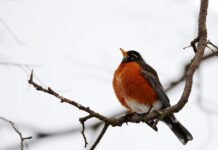Early New England was quite strict in its behavior. Song writers were not welcome or appreciated. Singing alone was also not part of accepted behavior.
Although singing is referred to in many instances in the Bible, to the Puritans it was ungodly practice.
By the 1700s they had come to tolerate it somewhat. Up to that era the Psalms of David were as close to singing as was permitted.
There were no choirs. Sometimes an elder, a presenter, or the minister gave out the tune and the psalm. Then the young people began to protest that procedure, stating there were enough books for all to join in reading as well as the leaders. Older members clung to the traditional method.
The turmoil that arose was similar to a later occurrence when the Scotch Presbyterians began to use an organ in their churches.
Even outside the New England early Colonial settlers could hardly be called singers. The songs that were sung were tunes from the Old Country.
With little or no singing being done, there was no encouragement to write songs. Prior to the American Revolution, there were no famous American songwriters.
William Billing’s, a tanner from Boston, was one of the first, writing in the late 18th century. He wrote his first compositions on the wall of his tannery and on pieces of leather.
His songs are collected in The Singing Master’s Assistant and The Psalm Singers Amusement. It is said he introduced the first pitch-pipe and the cello to lead the singing in churches.
In about the same era singing schools appeared. Folks of the 1820s knew these quite well. These schools appeared in various areas of America.
Music has been called “not food for the soul, but wine.” A lively tune or song stirs emotion of one kind or another in man, savage, or beast.
Of all the songs of old inspired by love of the home, “Home Sweet Home” has endured the trials of time. Like many early and recent songs it was written for the stage.
John Howard Payne wrote the lyrics while in Paris, France, adapting French plays and operas for the English stage. He became homesick for his home in America, and the words express his mood of affection and longing – a mood many have experienced for many decades. The music was adapted by Henry Bishop from an older song.
American song-writers have the distinction of being the creators of a unique form of popular rendition, the songs of the black folk.
Sometimes plaintive, sometimes lively and emotional, they are symbolized by plain, soothing, tender and appealing melodies. Ministerial shows introduced many to the public.
They were and are an unusual mixture of clownish, local, and contemporary humor and the black folk songs.
Foster’s songs. The songs “Way Down upon de Swanee River,” “My Old Kentucky Home,” “Old Black Joe,” and many others, about 160 altogether, were written by a Northern man, Stephen Foster of Pittsburgh.
Christy minstrels had a good reputation in Foster’s day, and nearly all of his songs were written for them.
Another Northern songwriter, Daniel Decaittor Emmett, wrote the ever popular “Dixie,” He was a minstrel himself and an actor known as “Old Dan Emmett.” Emmett also wrote “Old Dan Tucker” when he was 15.
Other well known songs were written during the early days of settlement, including “Yankee Doodle.” No one knows for sure how it became popular, except as a reverse rhyme back at the British.
“Hail Columbia” was written for the stage in 1798. It awakened feelings of pride and patriotism and promoted the idea that the young nation had problems enough without interfering with those of other nations.
Samuel Smith wrote “My Country ‘Tis of Thee.” He wrote a song to match the tune of the British national anthem. It is said that it took him only a half an hour to pen new words to the tune.
Other songs appeared during the 19th century.
“The Battle Hymn of the Republic” by Julia Ward Howe was the finest song to come out of the Civil War.
“Marching Through Georgia” by Henry Clay Work commemorated Gen. Sherman’s march to the sea, but it is purported that Gen. Sherman disliked the song.
Dozens of other famous tunes could be added to this list, but space is limited.
American is had some hymn writers to be proud of hymn-writers also.











